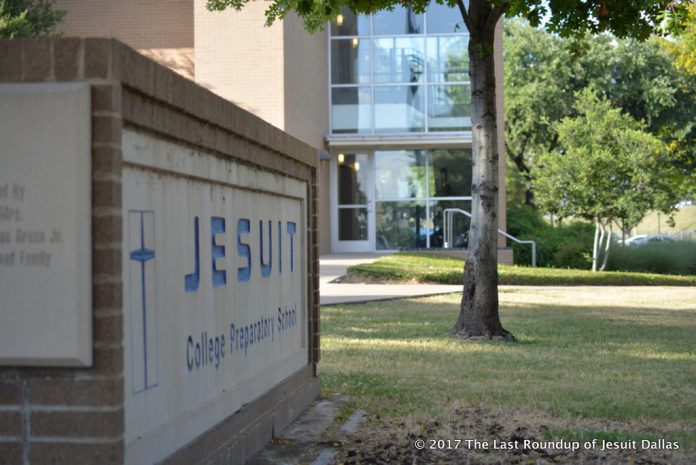12:47, the clock reads. Your eyelids are faltering, exhausted from the hours you’ve spent studying for your math test tomorrow. Even after spending countless minutes going over the difference between the cosine and sine functions, you still manage to get the practice problems wrong, all the while your looming theology homework sits to the side, untouched, meaning that tonight is going to be a long night.
If you’re a student at Jesuit, either this situation has happened to you before, or it will happen to you. So what could have prevented these long sleepless nights spent with your head buried in a textbook? Well, in the words of the Mr. Donahue, “Prior Proper Planning Prevents Piss Poor Performance.” In the spirit of encouraging efficient studying and bringing better grades, I will take you through a trilogy of studying skills and tips that will (hopefully) help you.
Welcome to Study Skills Part 1: The Students
Beginning with part 1, I decided to go to the root of the situation, which is ourselves. I interviewed 3 students who took varying levels of rigorous classes at Jesuit, yet each student is near the top of their class.
Student A graduated in 2017 with excellent grades and took all honors/AP classes at Jesuit, earning him a spot at the prestigious Brown University.
Student B will graduate in 2018 and is the valedictorian of his class, and has gone through Jesuit taking rigorous classes and almost all honors/AP offered to him.
Student C will graduate in 2019 and excels in his mainly regular classes coursework, earning him a spot near the top of his class.
My advice to you is to decide which student best describes you, whether you take rigorous classes or have other responsibilities and taken on-level classes, and notice the types of studying skills the student takes. Find what speaks to you, and most importantly I suggest just being open to what students are doing, and maybe giving it a try. Sometimes having the right mentality and discipline is just as important as knowing how to study. With that being said, let’s take a look at our students.
What was your schedule/routine after school ended?
Student A: Usually I stayed after for club meetings or something, and so I would get home around 5:30 or 6, so I would probably start homework around 7 or 7:30. I would take periodic breaks or so, and then would be done around 11 or 11:30, then go to Bed.
Student B: The grind never stops. Once school starts to kick in, essentially the entire day is school. I get home and maybe have time to eat, and on the way home that’s my relax time, but I start doing homework right after. After eating I plan out what I should do, what homework is due, what’s priority, looking at types of assignments and which ones I can do quickest and easiest. A 12 o’clock bedtime, that was a good day. A bad day is an all-nighter, that’s a bad day.
Student C: I work after school from 4-6 at St. Rita, it involves a group of kids that I help do homework and play with them, and sometimes I’ll have some down-time to do my own homework, but I’ll save the big stuff for when I get home which some nights is around 7:30 to 8. I usually finish around 11 to 11:30.
What is your approach if you’re assigned reading homework?
Student A: It depends on what I’m reading. If it’s an English book, let’s say a novel, then unless the teacher told me something specific to read for, then I’m just reading and annotating as I go and trying to find things that may connect, things that could be important in discussion. If it’s a math or science book, then I usually read through it and maybe take a few notes on a separate sheet of paper, then I go through and find practice problems that relate to it. Because at least with my brain I have to have practice problems for something to solidify in my brain, whereas with English stuff I can read and annotate and that works.
Student B: Depends on the reading… I usually try to take notes or at least highlight, because if not then I’ll forget what I’m reading. For history, for example, I would take notes on the vocab but I wouldn’t annotate the book itself, but when it comes to English I look for characters, changes, new settings or recurring themes, and make certain symbols in the margins for certain things to organize my annotations. For theology it was more of a highlighting and taking notes on the side, but each class has it’s own type of studying.
Student C: Readings for me, depends on how long they are. History readings, for example, I’ll look at and write down what I’m thinking when I’m reading. For books, I’ll underline things and write association’s next to words, sometimes bracket passages.
What is your approach to studying for a test or quiz?
Student A: The notes I take over readings are a good source, actually one skill I learned from a friend was that she would take notes during lectures, and to study she would type them up on google docs or something, because when you go back through all that information even if it doesn’t seem like you’re doing anything, when you read through it and type it up again it sticks in your brain better because you’re seeing it after the initial time. Flash cards are always good, I used that a ton in High School, especially good for memorization type stuff like sciences in particular… Mostly just being studious in how you approach studying, because I found myself studying until I was dead tired and I wasn’t studying by that point I was just staring at a dead page, so probably the most important thing to do is to study and then take breaks, you know? Make sure when you’re studying you’re actually studying and working through the material in an active way and you’ll find you’re learning more.
Student B: The way I usually study is I have to quiz myself. The big things when it comes to subjects like history and biology, we would have these huge notes, and I would pull the concepts out and the answers and would try to say them from memory. For vocab I would look at the vocab words and recite, and not only match the word to the definition and vice versa, try to not just memorize it but know it. When it comes to math I really just have to go back and redo all the work without looking at the answers, same with math-based sciences, it was just a lot of practice and going over and over, and doing things without helping yourself. More book-heavy classes like APUSH, it’s just quiz yourself over the vocab and concepts, and overall to know things rather than memorize them.
Student C: It depends on the subject. Last year I started doing a study group at a friends house for a couple hours, we’d go through the review guide and it was really big for Chemistry and Math especially. For quizzes I’ll usually leave it until the day of, since I have 3 free periods and I feel I pay attention during class and don’t play games so most of the information I’ll retain anyways. Definitely flashcards for vocab quizzes are a big thing, I only do them when I have a set term-definition, any other way I’ll type or write notes.
How do you deal with distractions?
Student A: I don’t tend to get distracted by my phone, but I can see it can bother other people so I’d just suggest turning it off and putting it away, I know for me I just have to find quiet places to work, like the library, where it’s fairly easy to concentrate because there’s no noise. Some people I know it works better for them to have background noise, so it’s kind of something you’ve got to figure out yourself.
Student B: I usually put my phone out of reach so I can’t use it, and I play white noise or quiet non-lyrical music to help drown out other distractions.
Student C: I don’t let myself get too distracted, even though I keep my phone next to me and check it often. the way I study is like 45 mins on and 15 mins off, so ill check it during those “off” minutes.
Are there any strange or unique study habits that you have?
Student A: That’s interesting… I don’t have a place like coffee shops that I study at. I don’t have a certain food or drink, but sometimes I’ll listen to music when I study. Instrumental music mainly as background noise, which helps me but I know other students can study with any music, I just avoid music with lyrics to help me concentrate.
Student B: I do sometimes when I’m reading and studying I put on headphones and listen to celestial white-noise thing, and that’s just to block out any sound that’s in my house or whatever. When it comes to breaks, I break whenever I catch myself drifting off, I get a drink of water or get a snack, or watch TV for a few minutes, or talk to somebody. I don’t let the breaks go on for too long, but they’re definitely necessary.
Student C: It depends on the test or the weight of the test, if it’s a quiz I don’t have any tradition, if it’s a big test I’ll be with friends studying, and we’ll work through our study guide and ask questions as needed. I’ll listen to music to keep me focused, a giant playlist of classic-rock type music.
How important would you say the relationship between teachers and students is in your success?
Student A: I’d say it plays a pretty big role overall, after all the teacher is the one who knows everything. Your relationship with your teacher is what allows you to go ask questions, and your classmates are a resources that’s almost as helpful, because no matter what class there’s always a guy who knows everything, and everyone has friends in their classes so you can talk to them and get together. Just using your teacher and friends for any questions you have or to bounce ideas off of can go a long way.
Student B: Relationships with students are really important, and teachers too. Teachers when I don’t understand something I just go to their office, so getting to know my teachers is really important because when I’m talking to them it’s a casual conversation and get to know them, so whenever you need anything it’s not awkward. Have a nice relationship with classmates and teachers because then you can ask them for help. For students some of them understand things faster than others, so the main thing is to ask for help. Even helping other people is powerful too because it shows you how much you know.
Student C: Huge role. I’m the kind of guy who could get along with most anybody. This year I’ve visited with teachers with specific questions because I feel it helps me for the test, because I when I ask those questions it helps me for the test, and then I can apply it to whatever study guide or review problems. You really need to be respectful of teachers because then they’ll like you when you have an issue in their class.
Do you have a planner or a method of keeping track of your homework?
Student A: I used a planner at Jesuit a lot, and I started using a Google Calendar this year actually which has worked really well.
Student B: No, I’m looking into getting a planner but I’ve kind of just been mentally keeping track of things, which is sort of a danger. I do keep notes sometimes, but it’s not always reliable.
Student C: Nah, I tried an app before but I just never ended up using it. I just think about the subject and use moodle calendars.
What motivates you for challenging yourself?
Student A: College Applications definitely, which sounds somewhat elitist because I wanted to get into a good school, but there’s also an element of taking harder classes to surround yourself with harder people which tends to make things interesting like discussions. Some classes I just generally enjoyed the content, so I was able to learn more and be proud of what I knew.
Student B: Taking advantage of the opportunities the school provides, I figure at this school, when I have the availability and capability to take an AP course but then I chose not to, I feel like I’m wasting the opportunity and in a sense the money that’s being put in. I also feel like I need to challenge myself… I’m luckily self-motivated, and if I put myself to do something I like getting it done, and it brings me some self-satisfaction.
Student C: You always want to be pleasing your teachers and your parents, and demonstrate what you’ve learned to the best of your ability, and on the other side there’s your future and get into a good college and be on the Honor Roll, which looks great on transcripts and all. So it’s that constant desire to have others be proud of you and to be proud of yourself.
What would be your advice to somebody who wants to study more efficiently?
Student A: Organize. Organize. Organize. Planning when you’re going to study is almost half the battle, because when you stick to your schedule it makes you much more efficient in your studying, and when you can almost see the end in sight it almost helps motivate you to keep studying well.
Student B: Test out different techniques. Don’t make them drastic that they would affect you on a test or something, but if it’s a small quiz try studying a different way, like switching from Quizlet to flashcards or vice versa, or like have a day where you study with a friend and have a conversation. Sometimes you need somebody to talk to, especially late at night. Try studying with people, try studying with white noise. Limit the noise in your room, just put yourself in a certain environment. Test things out, see what’s best for you.
Student C: Study with people, study with a good group of guys who are smart and stay on task. Who are willing to help you, the power of studying with friends is something I didn’t learn until last year but I wish I used freshmen year.
In taking all that information in, let’s synthesize some of the results.
Across the board, it seems all 3 students have a busy schedule, whether it’s with homework or extracurriculars, making time management greatly important. For readings, the recurring answer, and one that’s probably been stressed by every teacher, is annotations. Whether it’s annotating for discussions (A), recurring themes and vocab (B), or simply associations or what comes to mind (C), higher-achieving students seem to benefit from annotation. Likewise, annotation seems to change depending on the assigned reading, like an English reading versus a history reading, so take careful note of how you want to approach each assigned reading.
In regards to study habits, a common answer was utilizing flashcards for memorization of concepts and terms to try and solidify ideas in your brain, so if you haven’t tried flashcards yet that might be a viable resource. Some other interesting results were to retype notes up to help cement ideas in your brain by seeing it twice (A), or to study through quizzing yourself and going over practice problems until you don’t get them wrong (B), or even to employ the help of fellow students and create a study group (C), all valuable ways to help prepare yourself for an upcoming quiz or test.
Although each student has unique methods, removing distractions seems to be a trend when trying to study efficiently, like putting your phone away and listening to music. Relationships between teachers and students are a must, particularly for asking questions and understanding concepts as well as study groups. Only student (A) used a planner, while students (B) and (C) kept track of things by memory.
All in all, my hope is that after reading this article you have rethought the way you approach homework and studying. That maybe you start conversations with your friends and see the different ways the people around you study, and at the very least have considered ways you can change your studying to make it more efficient. Try things out, and find what works best for you.
That’s it for part 1, and stay tuned for part 2 where I will be analyzing study skills from the flip side of things.






